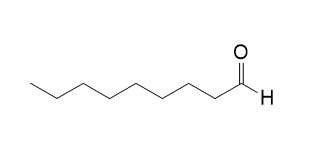Nonanal
Nonanal as a growth factor for wood-rotting fungi. It is also a potential attractant for the pine shoot beetle.
Inquire / Order:
manager@chemfaces.com
Technical Inquiries:
service@chemfaces.com
Tel:
+86-27-84237783
Fax:
+86-27-84254680
Address:
1 Building, No. 83, CheCheng Rd., Wuhan Economic and Technological Development Zone, Wuhan, Hubei 430056, PRC
Providing storage is as stated on the product vial and the vial is kept tightly sealed, the product can be stored for up to
24 months(2-8C).
Wherever possible, you should prepare and use solutions on the same day. However, if you need to make up stock solutions in advance, we recommend that you store the solution as aliquots in tightly sealed vials at -20C. Generally, these will be useable for up to two weeks. Before use, and prior to opening the vial we recommend that you allow your product to equilibrate to room temperature for at least 1 hour.
Need more advice on solubility, usage and handling? Please email to: service@chemfaces.com
The packaging of the product may have turned upside down during transportation, resulting in the natural compounds adhering to the neck or cap of the vial. take the vial out of its packaging and gently shake to let the compounds fall to the bottom of the vial. for liquid products, centrifuge at 200-500 RPM to gather the liquid at the bottom of the vial. try to avoid loss or contamination during handling.
Eur J Pharmacol.2023, 951:175770.
J.the Korean Socie. Food Sci.&Nut.2023; 52(1):26-39.
Int J Mol Sci.2020, 21(24):9369.
JPC-Journal of Planar Chromatography2023, 36:179-190
Separations2023, 10(11), 567;
Curr Med Sci.2024, 44(2):355-368.
Plants (Basel).2020, 9(11):1555.
Molecules.2017, 22(3)
J Appl Biol Chem.2024, 67:33,238-244
J Plant Biochem.Biotech.2024, 33:353-366.
Related and Featured Products
Journal of Applied Entomology, 2010, 128(9-10):639-644.
Evaluation of semiochemicals potentially synergistic to α-pinene for trapping the larger European pine shoot beetle, Tomicus piniperda (Col., Scolytidae).[Reference:
WebLink]
The pine shoot beetle, Tomicus piniperda (L.) (Col., Scolytidae) is an exotic pest of pine, Pinus spp., in North America. It is attracted strongly to host volatiles (±)-α-pinene, (+)-3-carene, and α-terpinolene. Attraction to insect-produced compounds is less clear. Other potential attractants include trans-verbenol, myrtenol, myrtenal, Nonanal and α-pinene oxide.
METHODS AND RESULTS:
We conducted a series of field experiments to determine if any of these compounds would increase attraction of T. piniperda to α-pinene, either individually or in various combinations.
CONCLUSIONS:
None of the individual compounds increased attraction. Although several combinations that included trans-verbenol, Nonanal, myrtenol, or myrtenal increased attraction, results were variable between experiments.
Journal of Chemical Ecology, 2008, 34(9):1180-1189.
Identification and field evaluation of grape shoot volatiles attractive to female grape berry moth (Paralobesia viteana).[Pubmed:
18649104]
METHODS AND RESULTS:
Solid-phase microextraction (SPME) and gas chromatography coupled with electroantennographic detection (GC-EAD) were used to identify volatile compounds from shoots of riverbank grape (Vitis riparia) that attract the female grape berry moth (GBM, Paralobesia viteana). Consistent EAD activity was obtained for 11 chemicals: (Z)-3-hexen-1-yl acetate, (E)-linalool oxide, (Z)-linalool oxide, Nonanal, linalool, (E)-4,8-dimethyl-1,3,7-nonatriene, methyl salicylate, decanal, beta-caryophyllene, germacrene-D, and alpha-farnesene. In flight-tunnel tests that involved female GBM and rubber septa loaded with subsets of these 11 compounds, we found that both the 11-component blend and a seven-component blend, composed of (E)-linalool oxide, (Z)-linalool oxide, Nonanal, (E)-4,8-dimethyl-1,3,7-nonatriene, decanal, beta-caryophyllene and germacrene-D, elicited equivalent levels of upwind flight as freshly cut grape shoots.
The removal of any of the seven compounds from the seven-component blend resulted in a significant decrease in female upwind flight responses.
CONCLUSIONS:
In a field trial with these two synthetic blends, traps equipped with either blend captured more female GBM compared to traps baited with hexane only (control), although the number of females caught was generally low. There were no differences in the number of males captured among treatments. Although in flight-tunnel trials, moths readily flew upwind to both grape shoots and rubber septa loaded with the best lures, they landed on shoots but not on rubber septa. Coupled with relatively low field catches, this suggests that additional host finding cues need to be identified to improve trap efficacy.



